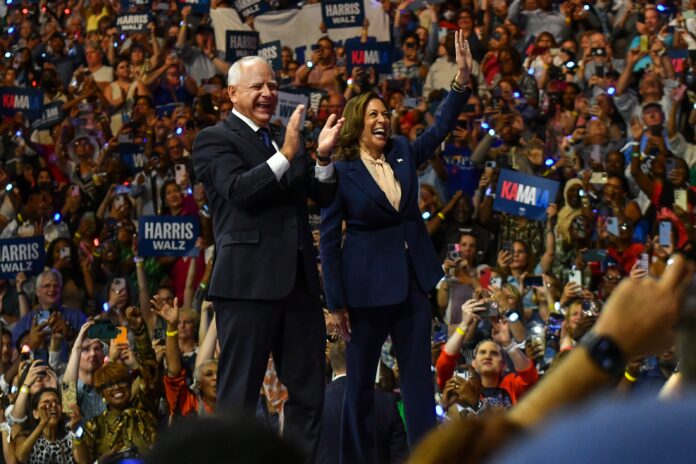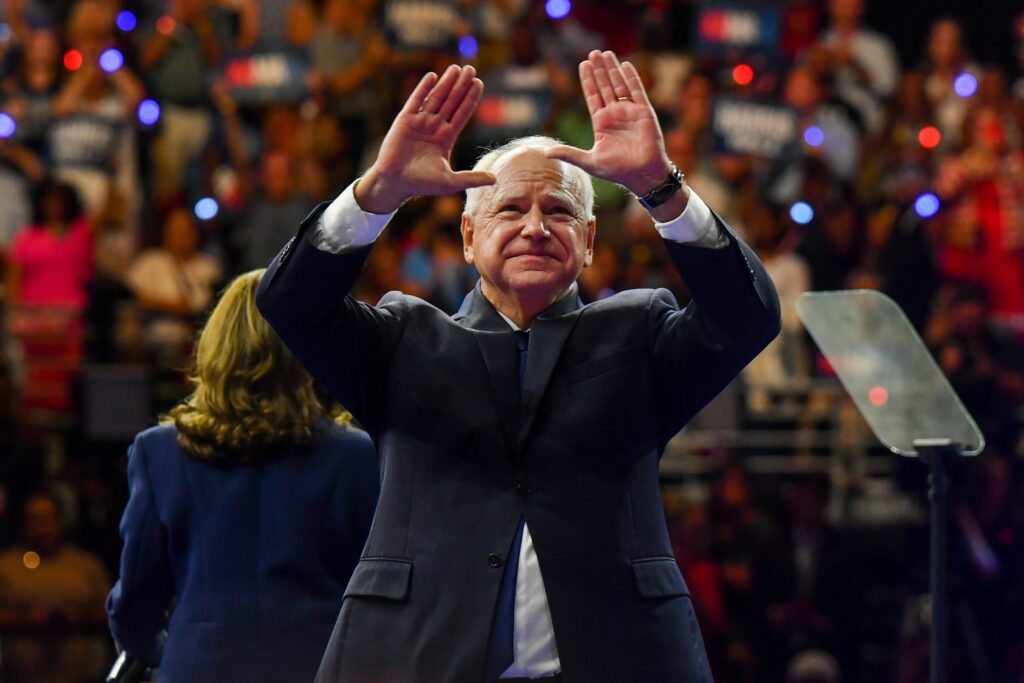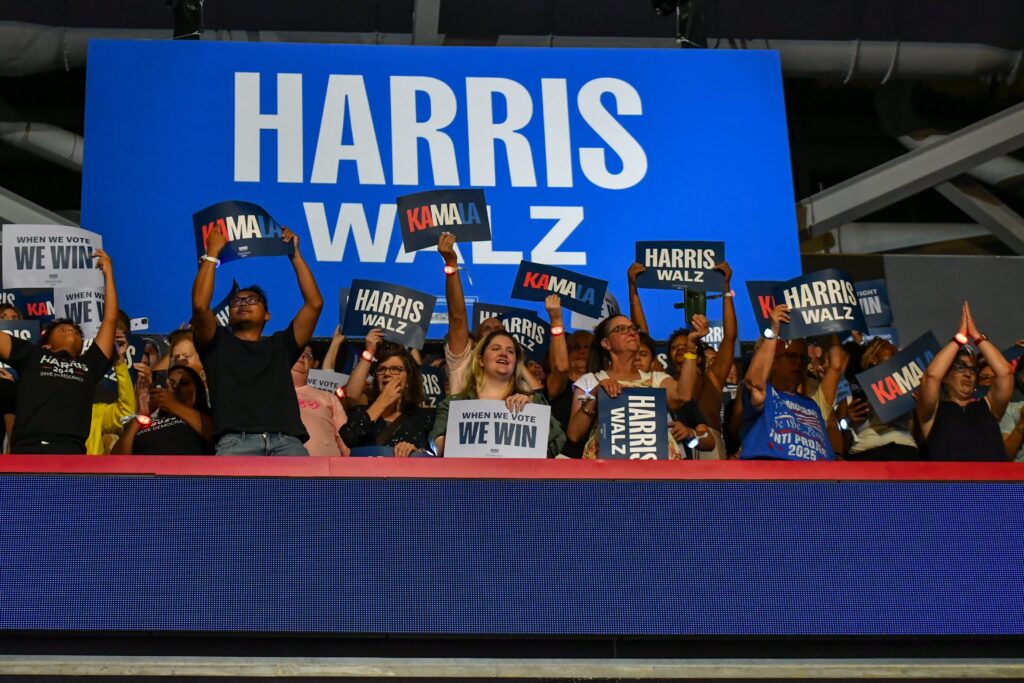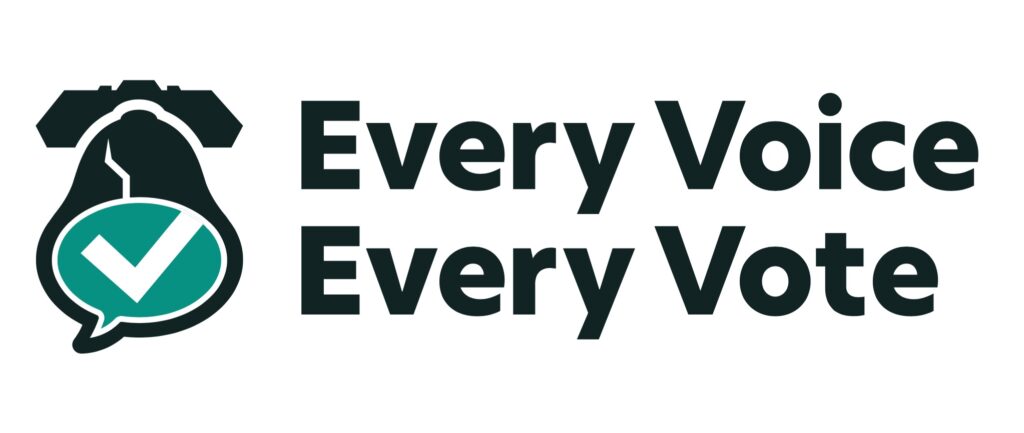
Just after 2:30 p.m. on Aug. 6— a full three hours before speeches were scheduled to begin, the line to get into Temple University’s Liacouras Center already stretched over six blocks long. People of all ages, races and walks of life anxiously awaited entry to the first rally Vice President Kamala Harris would hold with her running mate, Minnesota Gov. Tim Walz.
One mom from the suburbs waited with her daughter, who is trans. This year will be the first time the daughter is eligible to vote. Although both voters were planning to vote for the re-election of Joe Biden, they prefer seeing Harris at the top of the ticket. And they’re even more excited to vote for a trans-friendly veep in Walz.
“When I learned about how much Tim Walz has done for queer people — especially trans people — in his own state, I got a lot more hopeful about what’s possible for queer people across the country,” the teen said. “I think he’s someone who will actually work to protect us — more than anyone else we’ve had in those kinds of roles before.”

His track record as an ally to LGBTQ+ people and other marginalized groups is a refreshing shift from previous veeps — including Harris, who was criticized during the 2020 election cycle for previous missteps such as fighting to block an inmate’s access to trans-affirming healthcare and a failure to recognize intersectional issues as they relate to trans rights and sex work. However, she was also an early supporter of marriage equality and took steps to combat hate crimes.
Walz seemingly hasn’t needed the time and patience other political leaders have needed to get on board with publicly supporting LGBTQ+ people. And that might be because he hasn’t always been a politician.
Walz spent 20 years teaching social studies in a public school. In 1996, he helped an openly gay student start a Gay-Straight Alliance — during a time when LGBTQ+ students didn’t often find much support.
When he later took office, first as a congressman, in the early 2000s, he openly supported marriage equality, signed bills to protect LGBTQ+ people from hate crimes and workplace discrimination, and called for an end to “Don’t Ask, Don’t Tell.” As governor, he banned conversion therapy, made Minnesota a sanctuary state for people seeking trans-affirming healthcare, and made it illegal for libraries to ban LGBTQ+ books and content.
Those who gathered to catch a glimpse of Walz and Harris at the Philadelphia rally packed into a 10,000-seat indoor auditorium. An emcee hyped the crowd, popular dance music played, and a step team performed. Pennsylvania Gov. Josh Shapiro — who was a bit of a “runner up” in the candidate search — took to the stage first.
“I love you, Philly! And you know what else I love? I love being your governor,” he said, adding that he’s focused on “getting shit done” for Pennsylvanians and on getting these candidates elected.
He also underlined the negative impact Donald Trump and JD Vance could have if Walz and Harris do not succeed.
“He knows what he’s doing now,” Shapiro warned. “And the Supreme Court that he has packed has ruled that he is above the law — and now he’s got a clear plan. They all wrote it down in that Project 2025 thing. They’ve got a clear plan to take away more of our freedoms.”
The crowd chanted, “We’re not going back!”
Shapiro noted that candidates launched their joint campaign in the birthplace of American freedom, underlining, “Kamala Harris and Tim Walz believe in real freedom, where you can marry who you love and be who you are.”
The pair later walked onto stage together. Harris took to the podium first, welcoming those gathered and announcing that the electoral college had finished voting — making her the official Democratic presidential candidate.
Before introducing her running mate, she described her and Walz as the “underdogs” in the race to the White House.
“But we have the momentum and I know exactly what we’re up against,” she said, positioning herself as the prosecutor in contrast to Trump’s dishonesty and fraud conviction.
‘We fight for our future when we defend our most fundamental freedoms,” Harris emphasized. “The freedom to vote, the freedom to be safe from gun violence, the freedom to love who you love openly and with pride, and the freedom of a woman to make decisions about her own body – not having the government tell her what to do.”
She spoke about other issues that affect LGBTQ+ people — including affordable housing, health care, childcare, paid family leave, building a more inclusive economy, and lowering the cost of living.
Harris described Walz as more than a governor — as a product of a middle class upbringing, a GI Bill funded student, a husband, a dad, a veteran, a congressman and bipartisan leader, a high school teacher, and — and most emphatically, a coach.
Coach Walz, she said, used football to teach life lessons and “saw potential in kids who sometimes didn’t see it in themselves.” He motivated his players to believe they could achieve anything, she emphasized, and supported a previously winless team as they worked to become the school’s first-ever state champions.

The crowd burst into cheers when Harris spoke about his role in starting the school’s first GSA. She underlined that Walz knew that it would send a positive message about acceptance for the school’s football coach to serve as the group’s faculty advisor.
“As students have said, he made the school a safe place for everybody,” she added, describing Walz as “the kind of coach — because he’s that kind of person — who makes everyone feel like they belong.”
“That’s the kind of vice president America deserves,” she emphasized.
“In Minnesota, we respect our neighbors and their personal choices that they make — even if we wouldn’t make the same choice for ourselves,” Walz said, underlining that the government shouldn’t be able to invade anyone’s doctor’s office.
Walz said that health-care privacy and choice is a personal issue that he understands from firsthand experience as an IVF dad. He and his wife spent years trying to conceive.
“There’s a golden rule. Mind your own damn business!” he shouted, which those gathered began to repeat in a chant: “Mind your business!”
“Coach Walz and I may hail from different corners of our great country, but our values are the same,” Harris said about her running mate.
She noted that Walz was the first governor to enshrine reproductive freedom into state law after Roe v. Wade was overturned and highlighted that if Congress passes a law restoring reproductive freedom, she will sign it into federal law as president. Together, Harris and Walz also promise to expand and codify stronger protections for voters, require universal background checks before gun purchases, and ban assault weapons.
“We just gotta fight,” Walz underlined at the end of his own speech before reciting the campaign’s slogan. “Because as soon-to-be President Harris says, ‘When we fight, we win.’”

